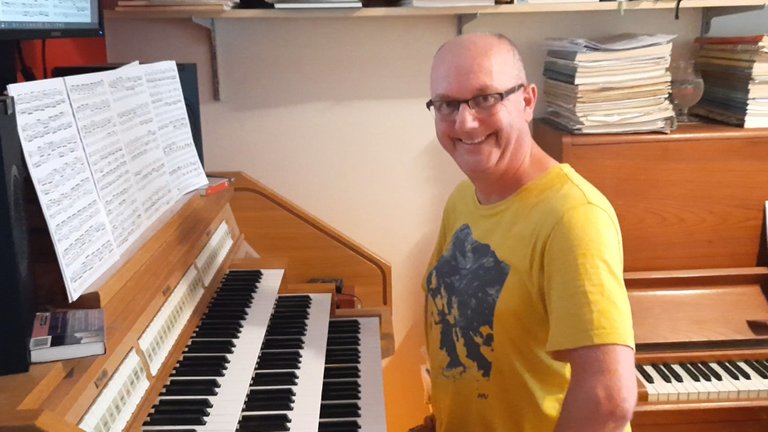
This is my entry for the Secrets of Organ Playing Contest, week 81. I play the fugue from Bach's Prelude and Fugue in a minor, BWV 543.
Playing Preludes and Fugues is perhaps at the core of playing the organ, especially when playing Baroque organ music. Bach, Buxtehude, Saxer, Buttstett, Vetter, Walter, etcetc, they all wrote Preludes and Fugues. And later organ composers, like Mendelsohn, Rheinberger and Richter recognised the importance of the model Bach set them and they wrote Prelude and Fugues as well.
The organ literature consists of a wealth of music on this particular type. The Prelude is a free work, that can be anything the composers thinks of. It can consist of chords, fast passage work or solemn melody lines and be rhapsody like free inventions or very formal through composed works. The fugue is of course just that, a fugue. It consists of one or more themes contrapuntally woven through all the voices (most of the time four or five) of the composition.
And as an organist I have of course practised and played a fair amount of Prelude and Fugues.
In my experience fugues are always more difficult then the preceding prelude. And they take up quite a lot more practising time. When I have mastered a prelude the first thought is that I am half way in mastering the complete work. Yet this is never true. The ensuing fugue always takes at more work.
So when I decided I should be able to practise and play one of the 'great' Prelude and Fugues by Johann Sebastian Bach, I thought it would be a good idea to reverse the order and start with the fugue. In mastering the fugue I should be more than half way in mastering the complete work.
I choose the Prelude and Fugue in a minor because I rely really like the fugue of this work. The fugue has a lively theme with an off-beat rhythmic figure that is quite hard to play consistently throughout the piece. The entire piece is build on this figure, so it is important to get it right and pay attention to the articulation of this rythmic figue in relation to its position in each bar.
I like this fugue because of it's arch of tension and the way it builds up to the final rhapsodic page. The most difficult part of this fugue to me is not that final page, but the first entry of the theme in de pedals and the following bars of 16th notes in the pedal. Actually, it is the one and only time the complete fugue theme is played in the pedals.
Characteristically, this comes out fine in my performance. It is in the easier bars 110 and 111 I make a bit of a mess of what I am actually supposed to play. Yet, I still like the drive in this performance, so here it is anyway, with mistakes and all.
Now, if I'm right, the prelude should take less work. And with a bit of luck it could be my entry for next week's contest.
The recording was done with the Hauptwerk software and the sampleset, made by Sonus Paradisi, of the Schittger organ in the St. Martini-kerk, Groningen (http://www.sonusparadisi.cz/en/organs/netherlands/groningen-st-martini.html).
I love hearing you play so much
!discovery 30
Thanks, that's a nice compliment
This post was shared and voted inside the discord by the curators team of discovery-it
Join our community! hive-193212
Discovery-it is also a Witness, vote for us here
Resteemed, your post will appear in the next curation post with a share for you!
Your post has been supported and upvoted from the Classical Music community (Subscribe at peakd and Steempeak) as it appears to be of interest to our community. We also support jazz and folk music posts!
If you enjoy our support of the #classical-music community, please consider a small upvote to help grow the support account!
You can find details about us below.
The classical music community at #classical-music, Peakd, Steempeak and Discord. Follow our community accounts @classical-music and @classical-radio or follow our curation trail (classical-radio) at SteemAuto!
Amazing! I can feel a full recital of yours coming up in the future on YouTube...
Thanks. Well who knows, somewhere in the future...
Spectacular! BRAVO BRAVO! You should be very proud of yourself.
Thanks! As a matter of fact, I am proud of this performance. There is still a lot of polishing to be done, nevertheless I'm quite pleased with how it came out.
I enjoyed your performance a lot. Well done!
Thanks! I'm glad you liked it.